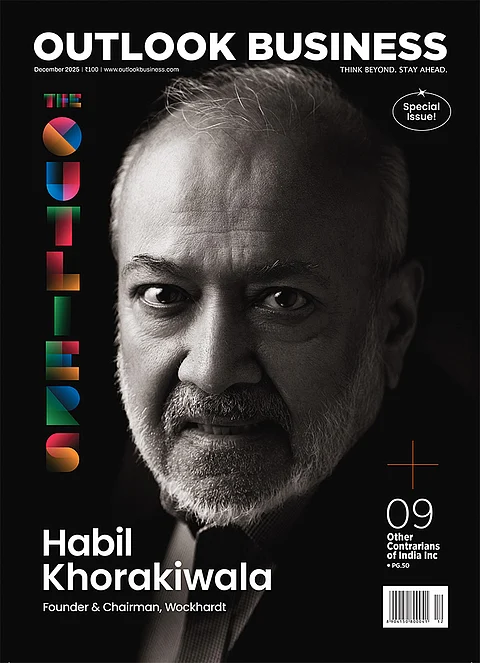Yo momma so fat’ shout the big letters in caps till you peer helplessly at the wearer to read, in small cases, ‘her favourite blouse is a tent’. The humour is priceless but the T-shirt, in black and coffee brown, can be had for ₹299 only on Inkfruit. The youthful concept of ‘wearing your attitude’ has been taken to another level by this very successful site — buyers not only purchase whacky stuff here, they design it, too.
“I love making myself heard through T-shirts,” says Naresh Saini, a 24-year-old BPO employee from Gurgaon, who found out about Inkfruit on Facebook and likes its designs, quality and prompt delivery. “Fashion is about making a statement, which could be either mild or bold. Earlier, the most provocative you could get was a Che Guevara T-shirt. Now, I have a bunch of websites that give me a whole range of quirky options. Inkfruit is among the best of them.”
 Unsurprisingly, it’s two young blokes who are behind Inkfruit — five years after they graduated from IIT-Bombay in 2002, Kashyap Dalal and Navneet Rai chucked their ‘regular’ jobs and plunged into the co-creation merchandise space. “In 2007, the merchandise range in India was very limited,” says Dalal. “There were only a few home-grown brands which were replicating the work of their international counterparts. India is filled with artistic talent but we didn’t have products or brands showcasing it.”
Unsurprisingly, it’s two young blokes who are behind Inkfruit — five years after they graduated from IIT-Bombay in 2002, Kashyap Dalal and Navneet Rai chucked their ‘regular’ jobs and plunged into the co-creation merchandise space. “In 2007, the merchandise range in India was very limited,” says Dalal. “There were only a few home-grown brands which were replicating the work of their international counterparts. India is filled with artistic talent but we didn’t have products or brands showcasing it.”
Of course, Inkfruit hasn’t been the only one smitten with the concept of selling funny T-shirts online — it competes with Cotton, Mango, Tshirts, 2mTees and good ol’ Tantra. But, “We don’t see Tantra as our competitor because the site only sells T-shirts whereas we have over 55 product categories,” says Dalal, somewhat annoyed. “Besides, we involve our users in the design of our merchandise.”
Inkfruit’s model is actually closer to Threadless, a Chicago-based e-commerce site following the co-creation model but, “The comparison ends there,” Dalal insists. “Threadless has confined itself to T-shirts whereas we have extended the co-creation model to other products. We see Inkfruit as the first company to have taken the co-creation model across products.”
It works like this: registered users upload designs for T-shirts, footwear and accessories on Inkfruit. The designs then go through a voting process. Typically, for every 4,000-5,000 design submissions, 25-30 designs get selected with at least 50,000-1 lakh positive votes. If a design is chosen, the designer gets prize money ranging from ₹5,000-50,000 and has his or her name tagged on the product. The copyright for the designs, though, lies solely with Inkfruit. “We believe that if a product is exciting, it will build its own fan following,” Dalal says.
Artistically yours
Unusually, Inkfruit is an accidental youth brand even though the average age of its 150 employees is 26 years. “When we started out, our focus was not on any particular age group,” says Dalal. “We only wanted to make interesting products for the young at heart.” The site’s customers are largely between 18-35 years, who want to stand out. Inkfruit products are also available in 40-50 retail stores, including 32 Lifestyle outlets across India.
Dalal says it’s very difficult to define what young people want. “There is no such thing as good or bad,” he says. “In our experience, the young tend to go for products that express their personality, and the more products we offer, the greater the chance of a visitor turning into a buyer.”
But attaining critical mass was not easy. “Even before coming to the customer side of things, we had to attract the best artists to our site,” says Dalal. “We did that through a lot of promotions in design colleges and the JJ School of Arts in Mumbai. Inkfruit is now a melting pot for artists.”
In January last year, Inkfruit raised $5 million from early stage venture capital firm, SAIF Ventures but despite about 1,500 transactions a day, like most e-commerce sites, Inkfruit is yet to make a profit. “We are gross margin positive but, overall, there have been large investments made in the site but we have not yet reached break-even,” Dalal says, adding it might happen by the end of the calendar year.
Inkfruit’s digital promos, currently its only form of advertising, are going to be bolstered with print and TV ads soon — a pilot campaign has already come out in Pune papers. “We want to offer more products for women, more choice in footwear and accessories, and introduce home décor products by the end of the year,” says Dalal. Last year, Inkfruit experimented with the idea of partnering with famous artists to convert their artwork into high fashion merchandise called Ezl. Dalal says new artists will be launched every quarter from now on.
The site doesn’t curate designs but it’s careful to avoid insulting and derogatory views. Provocative designs, on the other hand, are definitely welcome. “We received a lot of designs during the Anna Hazare anti-corruption movement last year,” says Dalal. “A lot of these designs had very blunt messages and they depicted popular sentiment very well.”
Some irresistible examples: the design of an error pop-up window which had a photo of politicians and a message that said ‘Please delete forever’. In another popular T-shirt, a bottle of pickle comes with the following lines: Beimaan logon ki pehli pasand. Bhrasht achar. Lalach ki dukaan me uplabdh, woh bhi muft. Warning: T-shirt sloganeering is addictive.











